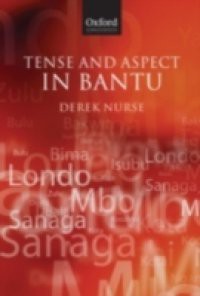Derek Nurse looks at variations in the form and function of tense and aspect in Bantu, a branch of Niger-Congo, the world's largest language phylum. Bantu languages are spoken in central, eastern, and southern sub-Saharan Africa south of a line between Nigeria and Somalia. By current estimates there are between 250 and 600 of them, as yet neither adequately classified nor fully described. Professor Nurse's account is based on data from more than 200 Bantu languagesand varieties, a representative sample of which is freely available on the publisher's website. He devotes substantial chapters to the analysis and comparison of the different tense and aspect systems found in Bantu. He also examines the verbal categories with which they interact, including negation and focus. Synchronic and diachronic perspectives are interwoven throughout the book. Following a brief history of Bantu over the last five thousand years, the final two chapters look systematically at the history of tense and aspect in Bantu. The first deals with the reconstruction of theearlier forms from which contemporary structures, morphemes, and categories are derived, and the second with the processes of change, including grammaticalization, by means of which older analytical structures and independent lexical items moved as they became incorporated as grammatical inflections andcategories.

